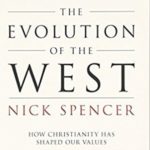Jordan Ballor is bringing Abraham Kuyper in from the cold. Kuyper is often celebrated as a distinctively Reformed—rather than a general Christian—thinker and statesman. This tends to move him outside mainstream Christian social thought. It conveys the impression that Kuyper’s insights are Reformed insights, rather than Christian insights or simply true insights. And it can tend to raise walls between Reformed Christians and other Christians.
Thus Ballor, an accomplished Kuyper scholar, has done us a great service by collecting and editing essays by Kuyper and Pope Leo XIII in his book, Makers of Modern Social Thought: Leo XIII and Abraham Kuyper on the Social Question. The “social question” at issue is the rise of the socialist impulse that unsettled European society in 1891 in response to growing inequalities of wealth, which Leo XIII and Kuyper both addressed at the time. Ballor observes that the social question is with us again today. Leo XIII and Kuyper are as relevant as ever. For this reason, the book deserves a careful read, even by those who have previously read the essays contained in it, Leo XIII’s encyclical Rerum Novarum and Kuyper’s lecture, The Social Question and the Christian Religion.
Ballor makes the case that the essays belong together as two (admittedly different) expressions of a broadly shared tradition of social thought. He sums up the gist of the book this way:
Although distinctive in their own ways, Leo’s and Kuyper’s reflections on Christianity and its relevance for the social question illustrate remarkable commonality and coherence on a variety of foundational points, including the centrality of the doctrine of anthropology, the significance of private property and human stewardship, and the normative value of the principles of subsidiarity and solidarity.
Start your day with Public Discourse
Sign up and get our daily essays sent straight to your inbox.
Ballor’s selection of those last two terms instead of their Kuyperian analogues—sphere sovereignty and sphere universality—sets a conciliatory tone that is maintained throughout his introductory essay. Subsidiarity and solidarity are generally associated with the natural law tradition, particularly the Roman Catholic expression of that tradition. Ballor’s word choice is one of several devices he employs to build a bridge from Kuyper to the broader tradition, rather than waiting for his interlocutors to come to him.
As Ballor emphasizes, Kuyper and Leo XIII stood mostly together, and both stood largely apart from (or above) the dominant trends and ideas of their day. Both emphasized the priority of institutions and associations of civil society in promoting human flourishing. Both stood against the derogation of property by socialists and the property absolutism of individualistic liberalism. Both criticized the dominant ideologies of the day—liberal individualism and social collectivism—as differing impulses arising from the same fundamental error. Untethering individuals from their natural associations and familial bonds leaves only the individual and the state, which, in Ballor’s summary of Kuyper’s observations, “serves as the nexus of identity and the enforcer of social progress.”
These common themes are grounded in a common anthropology. There emerges in the book a “disjunction between Christian and other modern approaches” to understanding the human person. Kuyper and Leo XIII stand on the same side of that divide. Ballor explains that their “criticisms of both atomistic individualism and collectivist socialism turn on the Christian vision of the human person created in God’s image for communion with him and community with one another.” Notice the definite article: the Christian vision. Ballor’s volume suggests that Kuyper and Leo perceived the same truths, though they expressed those truths in different languages and for different subsets of the Christian community, and sometimes emphasized different aspects of the vision.
Ballor is too good a scholar to ignore or elide differences between Kuyper and Leo XIII, and between Reformed and Roman Catholic social thought generally. For example, subsidiarity has hierarchies built into it, while Kuyper’s sphere sovereignty is more egalitarian. In Ballor’s words, Kuyper “emphasizes the formal equality of all social spheres and institutions before God.” This difference has important implications, which Ballor does not explore in his slim volume, but which he candidly flags. Kuyper’s essay itself resists a comfortable ecumenism, as where he traces a line from the “paganizing” influence of sixteenth-century popes to the terrors of the French Revolution.
An unexamined subtext running through Ballor’s book is the idea that Christian social thought itself is limited. At some point in social design, first principles yield to judgments of prudence. Most social questions do not yield one uniquely correct answer. Both the Reformed and the Roman Catholic traditions of social thought have at times tended to address these prudential questions in the abstract, as if societies are designed on a clean slate, and they have seemed more willing to consult science and philosophy than the intellectual riches of custom and private ordering.
This limitation emerges especially in Kuyper’s and Leo’s discussions of private property, which appears more individualistic in their accounts than it is in reality. This deficiency could be remedied by consulting successful property institutions, such as those found in Anglo-American common law. One would find there intellectual resources equal to the problems that gave rise to the social question of 1891 and to the questions of our own day. As both Kuyper and Leo acknowledged, the problems they addressed were not new in 1891. Centuries earlier, both common law and civil law had derived sophisticated and reasoned solutions to the problems created by sovereignty (the crown’s prerogative), liberty, unjust distribution (perpetuities, waste, and hoarding), and conflicts between labor and landed classes—solutions that were based on Christian and natural law principles. It might be fruitful to read Ballor’s book alongside the writings of English common law jurists Frederic Maitland and Frederick Pollock, both contemporaries of Kuyper and Leo XIII.
Another subtext is the role that natural law plays in enriching discussion of the social question. It will not surprise even first-time readers to find natural law strains in Rerum Novarum. But the natural law also performs important work in Kuyper’s essay.
Kuyper begins by distinguishing between “nature as it exists independent of our will, and our human art that acts on nature.” Here he echoes Aquinas’s differentiation between the order that human reason considers and the order that it makes and establishes. Kuyper argues that humans have a natural duty to cultivate and improve nature, to employ human art to “unlock nature’s hidden strength.” The “entire social question” arises from our neglect of this duty.
Kuyper also appeals to natural law implicitly. He applauds the pagan natural law philosopher and statesman Cicero for raising his voice against the exploitations of his day. He speaks of the nation as a “community willed by God . . . standing under the law of life that we are all members of one another.” This “human, this scientific, this Christian truth” is what the fomenters of the French Revolution denied. “And it is at bottom the individualism born of this denial that all of today’s society is moving away from.” Radical individualism dismantles the “order instituted” by God.
These premises and sentiments place Kuyper within the central tradition of Christian and natural-law thought. The various communities found in human society are oriented toward human goods. We can recognize and know those goods through the exercise of reason (while revelation perfects our understanding of them). And the authority and liberty of plural associations and institutions are necessary conditions of their realization.
Some contemporary Kuyperians tell a different story. They divide society up into spheres—the church, the state, the market, and so forth. These spheres are not oriented toward a common good—at least not a common good that can be recognized through the exercise of reason. So authority is not justified on the basis, or limited according to the requirements, of the common good. Indeed, each sphere is governed not by authority but rather by sovereignty. (In Ballor’s version of The Social Question, Kuyper uses both terms, but he seems to give them distinct meanings.) Each sphere received its sovereign mandate directly from God himself and retains its separate sovereignty after the fall of man. None of the spheres is answerable to the others in reason.
This is a simplification, of course. And I hasten to mention that some Kuyperian scholars (in addition to Ballor) today articulate views of authority that would seem quite recognizable to other Christians, or to a natural-law philosopher. Yet Reformed thinkers have tended to emphasize the separateness of sovereign spheres in ways that inhibit understanding of the foundational roles that Christianity, natural law, and natural authority play in shaping culture, law, and politics for the good.
Consider for example the tired trope, recited still by contemporary Reformed scholars (and others), that America and the West more generally were never Christian in a meaningful sense because slavery, child labor, and other sins existed in them. This fabrication is constructed from two errors, one obvious and the other more subtle.
The obvious error is a version of what Harold Demsetz termed the Nirvana Fallacy. Slavery and other exploitative practices were ubiquitous until post-Constantine societies and officials—Christian societies and officials—abolished them. The fact that abolition has not always been final and thorough simply reveals that Christian societies have sinners in them. This is another truth that no informed Christian would deny, as Christianity teaches that we all are sinners.
The more subtle error is a failure to distinguish between the different senses in which a political community—such as the states at the time of the American Founding—can be Christian. And this error is revealing. Christianity is embedded in America’s DNA. It is not manifest in her political institutions but is obvious in her fundamental laws and customs, and in the institutions of American civil society. “One of the beautiful boasts of our municipal jurisprudence,” proclaimed the great American jurist Joseph Story, “is, that Christianity is a part of the common law, from which it seeks the sanction of its rights, and by which it endeavours to regulate its doctrines.”
Kuyperians who insist that America is not a Christian nation can make their insistence seem plausible only by segregating the political sphere from the norms and institutions of the common law, which make our politics and constitutionalism coherent. To do that, they must reject Kuyper’s call to prioritize civil society and his admonition to avoid politicizing everything.
Ballor’s well-edited book suggests that Kuyper still has a lot to teach contemporary Kuyperians, and that the rest of us might learn something from him too.














